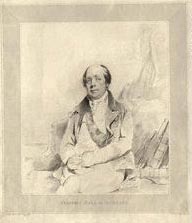
Frederick North, 5th Earl of Guilford
Encyclopedia

United Kingdom
The United Kingdom of Great Britain and Northern IrelandIn the United Kingdom and Dependencies, other languages have been officially recognised as legitimate autochthonous languages under the European Charter for Regional or Minority Languages...
politician and colonial administrator.
North was a younger son of Prime Minister Frederick North, 2nd Earl of Guilford (usually referred to as Lord North). He represented Banbury
Banbury (UK Parliament constituency)
Banbury is a constituency represented in the House of Commons of the Parliament of the United Kingdom. It is a strongly Conservative seat.The constituency was created January 26, 1554 through the efforts of Henry Stafford and Thomas Denton...
in Parliament from 1792 to 1794 and served as Governor of Ceylon
Governor of Ceylon
The British Governor of Ceylon was an official who ruled Ceylon during the British colonial period between 1798 and 1948....
from 1798 to 1805. The first British governor, Frederick North (1798-1805), proclaimed in 1801 that all rajakariya (royal service) was abolished and replaced it with a tax of one-fifth of their produce on low land and one-tenth on high land. North declared himself head of the salagama
Salagama
Salagama is the name of a caste in Sri Lanka. The community was traditionally associated with the cultivation and management of cinnamon, and also as soldiers,and are found mostly in Southern coastal areas, especially in the villages around Rathgama , Boossa and Balapitiya in Galle...
caste
Caste
Caste is an elaborate and complex social system that combines elements of endogamy, occupation, culture, social class, tribal affiliation and political power. It should not be confused with race or social class, e.g. members of different castes in one society may belong to the same race, as in India...
and appointed Robert Arbuthnot
Robert Arbuthnot
General Sir Robert Arbuthnot, KCB, was born at Rockfleet Castle, County Mayo, Ireland, on 19 November 1773 fourth son of John Arbuthnot Senior of Rockfleet, Co Mayo. He was a General in the army, a colonel in the 76th Regiment. He was a Brigadier General in the Portuguese Service and was appointed...
head of the karava caste
Caste
Caste is an elaborate and complex social system that combines elements of endogamy, occupation, culture, social class, tribal affiliation and political power. It should not be confused with race or social class, e.g. members of different castes in one society may belong to the same race, as in India...
; the Judicial Charter limited the governor’s autocracy by establishing the Supreme Court and High Court of Appeal.
In 1817 he succeeded his elder brother as fifth Earl of Guilford.
In 1824 North established the Ionian Academy
Ionian Academy
The Ionian Academy was the first Greek academic institution established in modern times and it is located in Corfu. It was established by Frederick North, 5th Earl of Guilford in 1824. It is also considered the precursor of the Ionian University. It had Philological, Law and Medical Schools.The...
on the island
Island
An island or isle is any piece of sub-continental land that is surrounded by water. Very small islands such as emergent land features on atolls can be called islets, cays or keys. An island in a river or lake may be called an eyot , or holm...
of Corfu
Corfu
Corfu is a Greek island in the Ionian Sea. It is the second largest of the Ionian Islands, and, including its small satellite islands, forms the edge of the northwestern frontier of Greece. The island is part of the Corfu regional unit, and is administered as a single municipality. The...
, which was under British
United Kingdom
The United Kingdom of Great Britain and Northern IrelandIn the United Kingdom and Dependencies, other languages have been officially recognised as legitimate autochthonous languages under the European Charter for Regional or Minority Languages...
control. It was the first University
University
A university is an institution of higher education and research, which grants academic degrees in a variety of subjects. A university is an organisation that provides both undergraduate education and postgraduate education...
to be established in Modern Greece
Greece
Greece , officially the Hellenic Republic , and historically Hellas or the Republic of Greece in English, is a country in southeastern Europe....
. The academy has now closed but a statue of the Earl
Earl
An earl is a member of the nobility. The title is Anglo-Saxon, akin to the Scandinavian form jarl, and meant "chieftain", particularly a chieftain set to rule a territory in a king's stead. In Scandinavia, it became obsolete in the Middle Ages and was replaced with duke...
stands on the island. Also a library and a street are named after him.
In 1791, he converted to the Eastern Orthodox Church
Eastern Orthodox Church
The Orthodox Church, officially called the Orthodox Catholic Church and commonly referred to as the Eastern Orthodox Church, is the second largest Christian denomination in the world, with an estimated 300 million adherents mainly in the countries of Belarus, Bulgaria, Cyprus, Georgia, Greece,...
and became an ardent adherent.http://www.joh.cam.ac.uk/library/special_collections/early_books/pix/provenance/guildford/guildford.htm
Lord Guilford died childless in October 1827, aged 61, and was succeeded in his titles by a cousin.

